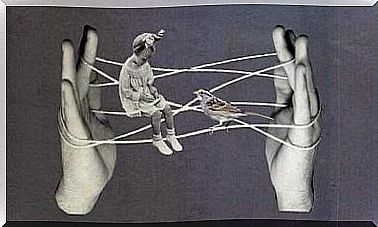I Should: Words That Limit Us

“I should be on a diet.” “I should call my mother.” “I should tell my boss I deserve a raise.” “I should exercise as the doctor advised me.” ” I should…” how many times a day do we torture ourselves with these words that only turn everything into bigger obstacles, obstacles that keep us captive and that are only kept alive on the basis that they never will. to happen?
‘I should…’ thus turns into a kind of utopia, into unfulfilled dreams, into impassable laws and into limitations that prevent us from moving forward. Without a doubt, these are words that tie us to our fears, our insecurities, and our lack of decisiveness. And so we need to get rid of this weight that has the power to make every road we travel more difficult.
I should… (fill in)
In the past few days, how many times have you said you should (or should have) done something? I take it you didn’t count it, but I bet you’ve said it more times than necessary. ‘I should’ is undoubtedly a huge part of our inner dialogues.
This sentence construction is connected with irrational ideas, you know, those beliefs that bother us and don’t let us live quietly. These beliefs are deeply rooted in our thoughts and dominate our existence. This wouldn’t be a bad thing if they acted as a starting point for something greater, but they do just the opposite: they block our inclination to act.
‘Should’ is often followed by ‘always’ or ‘never’. However, nothing is so final and strict. Many people use these words as a way to lie to themselves. They think that if they set themselves a task with a condition, this is like marking it in red on their agenda, when in reality – with their inner dialogue – they are really only empowering the chance that they won’t do it.
‘Should’ doesn’t act, it creates denial
When we indicate that there is something in particular that we should do, we usually do not express it as a direct act. Instead , everything remains an unfulfilled promise, an idea given over to chance or even an unconscious way of ‘convincing ourselves’ that we will change.
For example, if you say, “I should lose weight because the doctor told me that my latest tests don’t look good on me,” then you’re focused on the problem. This is fine. But you don’t think about a solution like that. Perhaps the sentence goes even further with “I should go on a diet too” or “I should go to the gym.” Both are theoretical acts, which we are likely to reject rather than accept.

If instead of constantly attaching so many preconditions to the future, we were to say ‘I’m going to start that diet’ or ‘I’m going to join the gym’, it might be easier to actually do the act. . However, it is still not ideal. So, the best thing to do in these situations is to just take the first step: remove everything that doesn’t fit into your diet from your fridge and throw it away or put on your sneakers and start working out.
Get rid of ‘I should’ for an easier life
Let us return for a moment to the example of the person who has been told by the doctor that he must take certain measures to lose weight, measures of which the patient really doubts the usefulness. Because the person does not understand the logic of what the doctor is proposing, he cannot control the situation. Perhaps if the doctor explained in detail the science behind the relationship between exercise and health, the patient would say ‘I should exercise’ instead of ‘I should exercise… but I don’t see why, except because it imposed on me’.
It’s not our fault that we have such irrational expectations and thoughts that begin with “I should.” After all, from an early age we are told what to do. We have to get good grades, we have to obey our parents and teachers, we have to succeed, we have to start a family… and so on.
Why ‘should I be doing all these things?’ Because this is what our culture, our society or our tradition tells us! What if we realized that passing an exam, always saying yes and amen to our parents, choosing the right study or getting married wouldn’t ‘should’ weigh so heavily?
When ‘should’ make us feel guilty and frighten us
The societal norms we live by have been around for a long time and most people don’t question them. All those moral and cultural laws that imply that we ‘should’ be all kinds of things may not be designed to harass or persecute us, but the fact remains that they often get in the way of our chance to make our own decisions.

What happens if we don’t do all those things we’ve been told from childhood that we “should” do? The very idea scares us, even if it would make us happier. If we don’t live up to what we ‘should’, we feel guilty.
The idea that ‘if we don’t adhere to social norms, we harm our society’ often doesn’t hold true. Just because we didn’t study and didn’t get a college degree doesn’t make us bad people. Just because we’re not married doesn’t mean we’re a threat to the community.
Focus on the actions that will make you happy, even if they aren’t among the “should” things. Get to work and turn your thoughts into action. Often enough it is certain irrational or transferred ideas that get in the way of a happy life.









